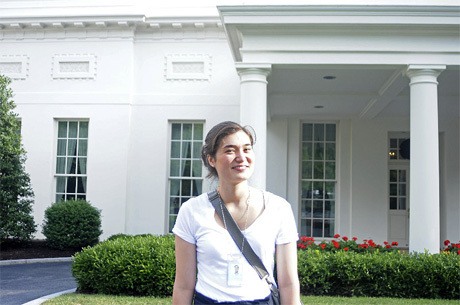It was a dream come true for Mika Kurose Rothman: spending a summer in the White House. Whenever she entered through the gates, she felt “privileged to be working for the Obama administration,” she said.
As an intern for the Office of Public Engagement, Rothman — a student majoring in media studies and social public policy at New York University — assisted with projects ranging from an immigration policy roundtable discussion to organizing a reception for Supreme Court Justice Sonia Sotomayor, to collaborating with foreclosure counseling organizations nationwide. Other projects included writing a presidential visit request memo for a nonprofit homelessness prevention organization, and a presidential message commemorating the League of United Latin American Citizens’ 80th anniversary.
The White House internship program, though offering no paid compensation, appealed to Rothman after she spent two years on the Obama campaign trail.
“To want to be a part of that, to work in the White House, where that change would be actualized and to help fulfill President Obama’s commitment to both rural Iowans and New Yorkers alike, was a no-brainer,” she said.
A typical work day — comprised of staff meetings, conference calls, spreadsheets and e-mails, and “substantially more coffee [than usual]” — started at 9 a.m. and ended at 7 or 8 p.m., Rothman said, and she also put in some 14-hour days, in addition to some weekends.
One of 10 interns in her department and 136 total summer interns in the White House, Rothman described the Office of Public Engagement as “a two-way road: one side brings various groups and stakeholders to ‘the table’ when policy is being made, to ensure that the most diverse voices are heard, in efforts to craft policy that is most effective and as helpful to as many Americans as possible. Once this policy is implemented, the other side of OPE’s ‘road’ reaches out to these different organizations and stakeholders, in an effort to make sure that the services and programs resulting from the enacted policy reaches the constituencies it was intended for.”
Rothman first became interested in public service and policy as a student on Mercer Island. It was in her eighth-grade civics class at Islander Middle School that the first seeds were planted — during a lesson on the disparity between salaries: a professional baseball players’ or corporate CEO’s millions as compared to an emergency medical technician’s or teacher’s thousands. “I remember deciding then and there that I wanted to work for justice and equality,” said Rothman.
And it was at Mercer Island High School — where she graduated in 2006 — that she studied the Civil Rights movement and “was exposed to the idea that just one event or one piece of legislation could significantly change things for the better, not just in terms of technical legality but also public perception. And it sort of answered my question, from the eighth-grade civics class, of how do you work towards justice and equality,” she explained.
Asked if the internship would have interested her if the administration was Republican, Rothman thought that, though it would not have appealed to her as much, “it would be a great opportunity to learn; it would be a very different experience, but potentially very interesting … At the same time, it’d be frustrating to be working for people who don’t hold the same views as I do.”
Currently a senior at NYU, Rothman intends to pursue a career in public policy.
“Ideally, I’d love to end up back at the White House; gotta dream big,” she said.



